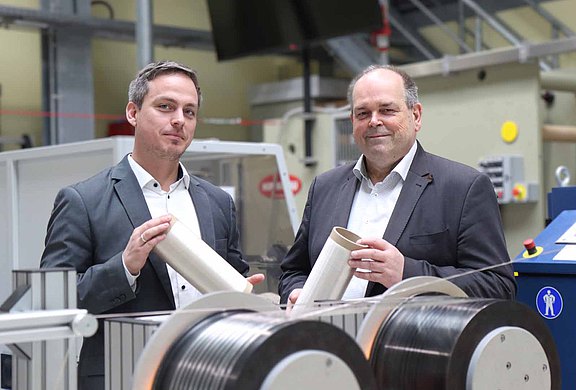The largest department of the Thuringian Institute for Textile and Plastics Research Rudolstadt (TITK) has a new head as of this month. On April 30, 2023, Dr. Frank Meister took his well-deserved retirement. His previous deputy Philipp Köhler now takes over the Native Polymers and Chemical Research division - and with it an almost 60-strong team of scientists, technicians and laboratory assistants.
With best wishes for the future, the managing director of TITK, Benjamin Redlingshöfer, bid farewell to the department head. "In his long and remarkable career, Dr. Frank Meister has played a major role in ensuring that the TITK Group is so solidly positioned today and enjoys a high level of recognition worldwide as a competent and trustworthy research partner, particularly through cellulose research. With Philipp Köhler, a convincing and, what's more, very likeable leader is now continuing the successful work of this important department."
TITK was a "perfect match" as an employer
Almost 30 years to the day, Dr. Frank Meister worked at Thuringia's largest business-oriented research institute. As a polymer chemist with a doctorate, he had changed from the central research department of Leuna-Werke to Rudolstadt on June 1, 1993. He still calls the move from Saxony-Anhalt to Thuringia and his start as a project manager at TITK a "perfect match".
His first field of work became the chemical modification of cellulose to make it directly formable without any solvent. Even then, however, the institute had begun to lay the foundations for a direct dissolution process - TITK's unique selling point. Subsequently, this independently developed process for direct dissolution and dry-wet forming of cellulose became established. The resulting special fibers could be transferred to commercial scale.
After just three years, Frank Meister became deputy head of the department, and then head of Chemical Research at TITK in 2001. Important milestones in his career? On the one hand, the 65-year-old naturally recalls more than 50 scientific publications, over 30 patents and at least 100 technical lectures in Germany and abroad. On the other hand, he was able to experience three managing directors of TITK and, relatively early on, worked on a large exclusive order from the then Wolff Walsrode AG. "The aim here was to activate cellulose in such a way that it could also be used for chemical derivatization," says Meister.
For the progress of the institute, the participation in the growth core "ALCERU-Hightech" around the patented process for the production of cellulose functional fibers was of enormous importance. The new method for direct incorporation of incompatible liquid or fusible substances into a cellulose fiber then also earned the TITK the Thuringian Research Prize in 2008.
Meister looks back with pride on the opening of the Hugo Richard Küttner Technical Center, which in 2011 gave the TITK the opportunity to realize all essential technological steps of direct dissolution and dry-wet forming of polymers in a common experimental field. The new general conditions bore many fruits. They resulted in several research contracts and multiple requests for technology transfer - for example, for a demonstration plant in Finland.
The "closing highlight" for Meister was Lyohemp® - the first lyocell fiber made from 100 percent non-wood pulp. This new development based on previously unused hemp residues exemplifies an eternally current research focus at TITK: the use of alternative raw materials and recycled materials.
Dr. Frank Meister is succeeded by Philipp Köhler
After 22 years as head of department, Meister is leaving with a clear conscience: "The fields are well tilled. And you have to be able to let go." He claims to have "always been first among equals": "A functioning team is always the decisive factor. And that you get involved in networks - nationally and internationally." This is precisely what he is passing on to his successor.
He has already been preparing Philipp Köhler for this task step by step for almost three years. "He is an excellent scientist with very precise ideas about his own development. And he is endowed with a high level of social competence," says Meister, explaining his choice. Philipp Köhler, at 33 now one of the youngest department heads TITK has ever had, is very grateful for this opportunity and also for the way he was introduced to his new position.
The fact that it is important not only to live in the here and now, but to already look ahead, is a principle he is determined to maintain. "Because even renewable raw materials like wood are only available in limited quantities. That's why we have to start thinking today about what could serve as a fiber raw material afterwards." For example, proteins or bacterial cellulose, says Köhler. "Where others are looking, we already have to have thought through solutions and have industrially suitable, applicable processes ready, which are sustainable and resource-efficient to boot."
The native of Saalfeld came to TITK in September 2014 - directly after studying materials engineering at Ernst Abbe University in Jena. With his "Master of Engineering" in his pocket, his unsolicited application was immediately successful. As a research assistant, he took over existing projects and helped, among other things, to further improve existing products with functional fibers. He is currently writing his doctoral thesis under Professor Chokri Cherif at the Technical University of Dresden. Incidentally, it also deals with alternative materials for fiber production.
